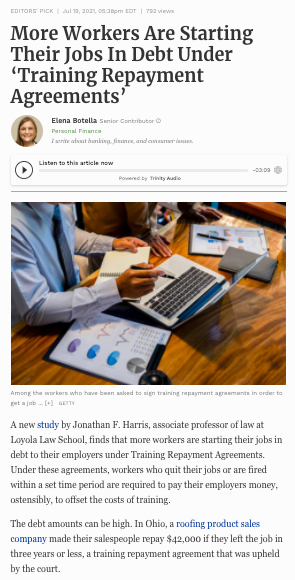For Forbes, I dug into a disturbing trend: workers being asked to sign “Training Repayment Agreements” to repay the (putative, highly inflated, and sometimes completely fabricated) cost of their on-the-job training if they quit or are fired within a set time period. In some cases, the TRAs take 3 years or longer to expire, and can involve $70,000 or more in debt.
-
-
Get a 20 cent raise; lose your child care
We need to do a better job of supporting parents, whether they’re working, in school, or taking care of children full-time. At the federal minimum wage, paying for child care for one child would take the first 26 hours of wages in a 40 hour week (if it’s an infant, the first 32 hours of wages). All 50 states have some amount of federally-funded assistance to help parents afford child care, but in many states these programs have long wait lists, or have extremely limited eligibility. In Iowa, parents lose all assistance at 145% of the federal poverty line (an income of around $25,000 per year for a parent with…
-
What a job search custom tells us about the death of free-market egalitarianism
In the Wealth of Nations, Adam Smith imagined a pin factory with ten workers, and predicted that capital owners would be on the factory floor doing manual labor alongside their employees. Instead, Amazon packs thousands of workers into each of its warehouses, and some of those workers reportedly pee into plastic bottles for fear of getting disciplined if they “waste time” on bathroom breaks. Meanwhile, Jeff Bezos is a millionaire, 151,000 times over. In my latest essay for The Outline, I talk about how the custom that job candidates should send thank-you notes to their interviewers fits into a long history of workers being placed socially and culturally beneath management.…
-
One in four “gig economy” workers would take a normal job at a lower pay
In a recent working paper for the Federal Reserve of Boston, Anat Bracha and Mary Burke find that 26% of gig economy workers would accept a lower hourly wage to be able to work hours at a formal job instead of in the informal economy — even if the formal job didn’t come with benefits. While informal and ‘gig’ jobs are sometimes presented as offering greater flexibility and autonomy, Bracha and Burke’s findings strongly suggest that many would gladly ditch gig work in favor of greater predictability. Their working paper also finds that the census districts with the highest rate of informal and gig labor force participation have the lowest…



